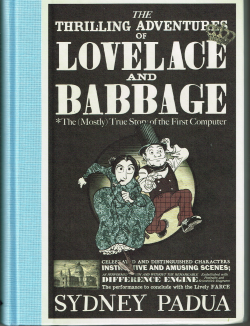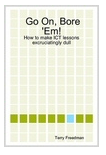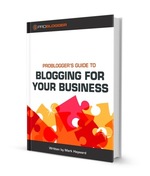As it's World Book Day, what are my recommendations for books for teachers of Computing? This is by no means a definitive list -- think of it more as a starter.
Read MoreRemember these?
Remember these?
As it's World Book Day, what are my recommendations for books for teachers of Computing? This is by no means a definitive list -- think of it more as a starter.
Read MoreWe live in an age where it's impossible to forget anything. Is this a good thing?
Read MoreA must-read for anyone who has taught in "challenging" schools!
Read MoreIn total around 70 topics are covered, not all of them curricular.
 Ada Lovelace died young, at the age of 36, and Charles Babbage never built his Analytical Engine. Had Lovelace lived, and had Babbage actually built his invention, the computer would have been invented a hundred years before it was.
Ada Lovelace died young, at the age of 36, and Charles Babbage never built his Analytical Engine. Had Lovelace lived, and had Babbage actually built his invention, the computer would have been invented a hundred years before it was.
Isn't that an astonishing thought?!
 Have you ever studied Computer Science? If not, teacher Roger Davies, who teaches at Queen Elizabeth School, Kirkby Lonsdale, Cumbria urges you to read a wonderful new book.
Have you ever studied Computer Science? If not, teacher Roger Davies, who teaches at Queen Elizabeth School, Kirkby Lonsdale, Cumbria urges you to read a wonderful new book.
 You might think that a book about making money from your writing other than from royalties has nothing much to do with teaching Computing, but it definitely has, for a number of reasons.
You might think that a book about making money from your writing other than from royalties has nothing much to do with teaching Computing, but it definitely has, for a number of reasons. Whether you're a newly qualified teacher starting out on your career, an experienced classroom practitioner, or somewhere in between, you will find something to take away from Terry Freedman's digital publication Go On Bore ‘Em, says Ben Davies.
Whether you're a newly qualified teacher starting out on your career, an experienced classroom practitioner, or somewhere in between, you will find something to take away from Terry Freedman's digital publication Go On Bore ‘Em, says Ben Davies. Mr. Freedman uses his extensive experience to write a clear and concise booklet on the different ways he has observed teachers instructing their students straight into boredom purgatory. But, he also explains how the lesson could have been changed to make it more interesting.
Mr. Freedman uses his extensive experience to write a clear and concise booklet on the different ways he has observed teachers instructing their students straight into boredom purgatory. But, he also explains how the lesson could have been changed to make it more interesting.
 I received a very nice review from Jacqui Wilson, a classroom teacher in Tasmania. Is a book about what made ICT boring still relevant if the focus is on Computing? Well I think so, because the issues I highlighted with respect to ICT are in danger of arising again with respect to Computing. Anyway, read what Jacqui says about the book.
I received a very nice review from Jacqui Wilson, a classroom teacher in Tasmania. Is a book about what made ICT boring still relevant if the focus is on Computing? Well I think so, because the issues I highlighted with respect to ICT are in danger of arising again with respect to Computing. Anyway, read what Jacqui says about the book.
 When I first picked up this book I made an error of judgement. Noticing that it seemed quite slim, I thought I could finish reading it in just one or two sessions. However, what I had not counted on was the book’s living up to its title. In short, it made me think. It made me think about what the author was saying in its own right, that is whether or not I agreed with it. It also caused me to reflect on my own practice as a teacher and, now, as a consultant.
When I first picked up this book I made an error of judgement. Noticing that it seemed quite slim, I thought I could finish reading it in just one or two sessions. However, what I had not counted on was the book’s living up to its title. In short, it made me think. It made me think about what the author was saying in its own right, that is whether or not I agreed with it. It also caused me to reflect on my own practice as a teacher and, now, as a consultant. You could argue that crossword solving is a very good example of computational thinking. That is certainly what the security services thought during WW2 when they asked The Times to send them the names of anyone who could solve a cryptic crossword they’d supplied in 12 minutes or less. Those that did were invited to work at Bletchley Park, cracking codes for the war effort.
You could argue that crossword solving is a very good example of computational thinking. That is certainly what the security services thought during WW2 when they asked The Times to send them the names of anyone who could solve a cryptic crossword they’d supplied in 12 minutes or less. Those that did were invited to work at Bletchley Park, cracking codes for the war effort. If you're looking for a handy, no frills book of suggestions for blogging, this book should meet your requirements. Having been designed as an email course, 30 Day Blogging Challenge, written by Nikki Pilkington, consists mainly of 30 very short articles on different aspects of blogging. Being able to buy the whole lot in the form of a book is excellent for those of us for whom deferred gratification is an alien concept.
If you're looking for a handy, no frills book of suggestions for blogging, this book should meet your requirements. Having been designed as an email course, 30 Day Blogging Challenge, written by Nikki Pilkington, consists mainly of 30 very short articles on different aspects of blogging. Being able to buy the whole lot in the form of a book is excellent for those of us for whom deferred gratification is an alien concept.
 Before looking at the book, written by Mark Hayward, in detail, it’s worth pointing out what the book is, and is not. It is, as the title implies, concerned with blogging in order to promote your business. It is not about blogging as a business in itself. It’s an important distinction, not least because once we take money out of the equation then “business” can be used as shorthand for any type of enterprise, including a charity, a cause – and a school.
Before looking at the book, written by Mark Hayward, in detail, it’s worth pointing out what the book is, and is not. It is, as the title implies, concerned with blogging in order to promote your business. It is not about blogging as a business in itself. It’s an important distinction, not least because once we take money out of the equation then “business” can be used as shorthand for any type of enterprise, including a charity, a cause – and a school.
 Subtitled “The way we’ll live next”, this book by John Kasarda and Greg Lindsay looks at the possible airport city of the future. At the moment, airports are usually located outside the main part of the city. Yet, given the fact that we still need actual physical goods to be delivered, some might argue that it makes sense for cities to be built around airports.
Subtitled “The way we’ll live next”, this book by John Kasarda and Greg Lindsay looks at the possible airport city of the future. At the moment, airports are usually located outside the main part of the city. Yet, given the fact that we still need actual physical goods to be delivered, some might argue that it makes sense for cities to be built around airports.
So there I was, feeling pretty tired from working too hard, thinking to myself that I really need a break from everything related to educational technology. “I really must get out more.”, I told myself.
 Definitely worth reading!And indeed I have, metaphorically speaking, by embarking on a novel by Jeffery Deaver, called The Blue Nowhere. It involves computer hacking. (It’s possible that I haven’t quite got the concept of getting away from it all.)
Definitely worth reading!And indeed I have, metaphorically speaking, by embarking on a novel by Jeffery Deaver, called The Blue Nowhere. It involves computer hacking. (It’s possible that I haven’t quite got the concept of getting away from it all.)
Like all Jeffery Deaver books, there’s an intriguing plot and, no doubt, plenty of plot twists to come. I have read only about an eighth of it, therefore I cannot review it exactly, just give my impressions so far.
It features a computer hacker who selects his murder victims and then gets to know all about them by hacking into their computers. As an aside, it’s interesting to note how much seems to have changed, in both technology and terminology, in the nine years since the book was published in 2001. For example, do we continue to draw the distinction between hackers (the good guys, or at least the not-really-evil guys), and crackers, the nasty pieces of work? Does anyone still do phreaking, that is hacking into telephone systems in order to make free calls overseas? If so, haven’t these people heard of Skype?
Of course, they did it, and possibly still do it, for the challenge. This isn’t directly relevant in regards to this book, but it’s of tangential interest. An understanding of human behaviour, and human nature, is an essential weapon in the true hacker’s armoury. It’s long been recognised that the biggest hole in sophisticated security systems is the human element, and serious hackers – the really serious ones -- are very adept at social engineering. That is, appearing to be someone you’re not (a computer repair person, for example) and, like all good con artists, brilliant at getting people to actually want to help you.
This is very much a theme in the book, as is the issue of keeping oneself safe online. The book is probably too long to make it feasible to set as an assignment (though it might go on a recommended summer reading list if you teach older ones), but there is much to be drawn from it in a professional sense.
You would have to go about this sensitively. Without care, using the book to bring out these kinds of issues could lead to some students – and their parents – becoming totally paranoid about going online at all. As you’ll see if you read the book, keeping safe isn’t entirely a matter of ‘stranger danger’ and not meeting online friends in real life.
But if you’re worried about scaring the kids then you could just read the book for its own sake, for relaxation.
Which is what I’m going to do for the rest of the day.
To purchase the book, click on the picture above and you'll be taken to Amazon UK, where you can buy the book and thereby help me to put some more crumbs on my family's table, courtesy of the Amazon affiliate scheme. Thank you.
(c) Terry Freedman All Rights Reserved